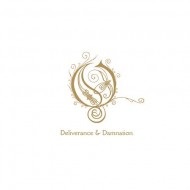 Not long before receiving this 2015 re-issue of these stylistically divergent albums which came out close to each other in 2003, I read a media post in which the commentator remarked on a recent Opeth live show. The post was about lead band ember Mikael Akerfeldt’s dry humour and the poor sound quality. There was no mention of the music. We all have our experiences of bands but mine with Opeth was the same. I’ve seen them play several times and their album releases were a major event but I remember leaving a concert at the Forum in Kentish Town Road around 2005 feeling quite disappointed after an hour of what I can only describe as sonic screeching, caused by the sound quality. At the same time I tried to like “Ghost Reveries” (2005) but for me it didn’t have the majesty of any of Opeth’s previous albums – I can’t single any one out because they were all brilliant. The magic had gone and since then I’ve not shared the global acclaim that Opeth have continued to attract.
Not long before receiving this 2015 re-issue of these stylistically divergent albums which came out close to each other in 2003, I read a media post in which the commentator remarked on a recent Opeth live show. The post was about lead band ember Mikael Akerfeldt’s dry humour and the poor sound quality. There was no mention of the music. We all have our experiences of bands but mine with Opeth was the same. I’ve seen them play several times and their album releases were a major event but I remember leaving a concert at the Forum in Kentish Town Road around 2005 feeling quite disappointed after an hour of what I can only describe as sonic screeching, caused by the sound quality. At the same time I tried to like “Ghost Reveries” (2005) but for me it didn’t have the majesty of any of Opeth’s previous albums – I can’t single any one out because they were all brilliant. The magic had gone and since then I’ve not shared the global acclaim that Opeth have continued to attract.
Listening to “Deliverance” and “Damnation” again brought all the good memories back. The twist here is that “Deliverance” is remixed by Bruce Soord of Pineapple Thief fame. The remixing of “Damnation” is the work of prog rock supremo Steven Wilson, whose understanding of sound and mood is second to none and whose contribution to earlier Opeth albums enhanced already great pieces of music. “Deliverance” and “Damnation” were the heavy and light balance, the yin and yang but being Opeth are sophisticated expressions of progressive metal music. It all came back. The swells and the surges, the rising majesty and the delicate touches are all there. Right from “Wreath”, classic swathes of death metal swept me along once again. Layers come from underneath and re-appear, having already entered our psyche. Here it heads into more classic metal territory with a solo and there’s an acoustic break. Such tinkering with this classic piece is unnecessary but the majesty remains. How do you enhance such exciting and haunting tracks as “Deliverance”? The answer is that you don’t. That line from Fair Judgement speaks: “Nothing’s left … here”. The word “here” has never been spoken with such impact and meaning. So too “Master’s Apprentices” is massive and expansive. It is a total experience in sophisticated and shadowy death metal. The growls on “By the Pain I See in Others” are harsher and it’s more ferocious but this is mere tampering at the edges of innovative and evocative progressive death metal.
It’s an over simplification to say that as ”Deliverance” is harsh, “Damnation” is gloomy because the perfection lies in the balance of atmospheres. “Damnation” is quieter and more melancholic in its nature than “Deliverance”. The sound waves are beefed up here and there. Shivers are sent down my spine as Akerfeldt pronounces “I’m longing for the darkness” and “Closure”, from which this line comes, launches into a hypnotising drum beat. The softness of Akerfeldt’s tones are remarkable, and yet calming as they are, there’s something sinister luring. “Hope Leaves” is typically melancholic but it’s as if we’re in a world of dreams that we cannot control. Moody, shadowy keyboard sounds accentuate “Weakness” and I was reminded that my only disappointment about this dual experience was that it all ends on such a sultry note. But it’s to Opeth’s credit that they have created this atmosphere and implanted it and many others in our head.
“I’m scratching my head wondering how the hell we came up with these songs”. This quote comes from Mr Akerfeldt himself. I’m glad he thinks that too. “Wicked and strange” is how he describes the songs. What a re-discovery this was. Although coming from differing musical origins, both “Deliverance” and ”Damnation” contain swirling and majestic atmosphere into which the listener is drawn in. For me, the remixes are irrelevant and unnecessary. I experienced what I heard in 2003. “Deliverance” and “Damnation” are masterpieces in their own right.
(9/10 Andrew Doherty)

Leave a Reply